Scammel Surname Ancestry ResultsOur indexes 1000-1999 include entries for the spelling 'scammel'. In the period you have requested, we have the following 22 records (displaying 11 to 20): Single Surname Subscription | | | Buying all 22 results of this search individually would cost £128.00. But you can have free access to all 22 records for a year, to view, to save and print, for £100. Save £28.00. More... |
These sample scans are from the original record. You will get scans of the full pages or articles where the surname you searched for has been found. Your web browser may prevent the sample windows from opening; in this case please change your browser settings to allow pop-up windows from this site. Inhabitants of Plymouth in Devon
(1790-1797)
The provincial sections of the Universal British Directory include lists of gentry and traders from each town and the surrounding countryside, with names of local surgeons, lawyers, postmasters, carriers, &c. (the sample scan here is from the section for Nottingham). The directory started publication in 1791, but was not completed for some years, and the provincial lists, sent in by local agents, can date back as early as 1790 and as late as 1797.
SCAMMEL. Cost: £6.00.  | Sample scan, click to enlarge
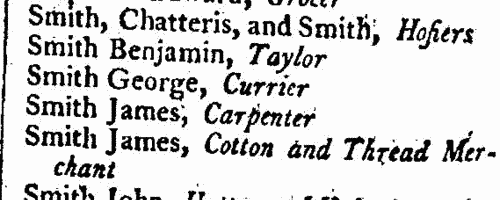
|  Apprentices registered in Dorset
(1797) Apprentices registered in Dorset
(1797)
Apprenticeship indentures and clerks' articles were subject to a 6d or 12d per pound stamp duty: the registers of the payments usually give the master's trade, address, and occupation, and the apprentice's name, as well as details of the date and length of the apprenticeship. There are central registers for collections of the stamp duty in London, as well as returns from collectors in the provinces. These collectors generally received duty just from their own county, but sometimes from further afield. The indentures themselves can date from a year or two earlier than this return. (The sample entry shown on this scan is taken from a Bristol return. Each entry has two scans, the other being the facing page with the details of the indenture, length of service, and payment of duty.) IR 1/68SCAMMEL. Cost: £8.00.  | Sample scan, click to enlarge

|  Apprentices registered in Wiltshire
(1803) Apprentices registered in Wiltshire
(1803)
Apprenticeship indentures and clerks' articles were subject to a 6d or 12d per pound stamp duty: the registers of the payments usually give the master's trade, address, and occupation, and the apprentice's name, as well as details of the date and length of the apprenticeship. There are central registers for collections of the stamp duty in London, as well as returns from collectors in the provinces. These collectors generally received duty just from their own county, but sometimes from further afield. The indentures themselves can date from a year or two earlier than this return. (The sample entry shown on this scan is taken from a Bristol return. Each entry has two scans, the other being the facing page with the details of the indenture, length of service, and payment of duty.) IR 1/70SCAMMEL. Cost: £8.00.  | Sample scan, click to enlarge
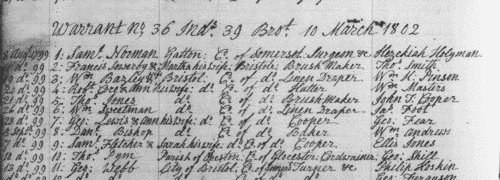
| Bankrupts
(1786-1806)
William Smith's abstracts of bankrupts, dividends and certificates for England and Wales from 1786 to June 1806. Bankruptcy causes abrupt changes in people's lives, and is often the reason for someone appearing suddenly in a different location or in a different occupation.SCAMMEL. Cost: £4.00.  | Sample scan, click to enlarge
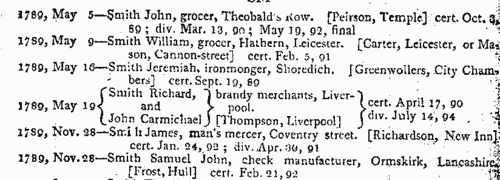
| Missionary donations from Wiltshire
(1855)
The Congregational and a number of other independent churches together formed the Evangelical Alliance, committed to promoting and supporting missions to the heathen. The areas chosen for their projects were Guiana, South Africa, India, the South Seas and China. The work of the missionaries was not only in preaching the Gospel, but also in translating the Bible into local languages, and establishing churches, schools and orphanages. Orphans and native teachers were often given the names of principal contributors or congregations back in Britain. In Britain the large amounts of money needed for this work were raised among the Congregational and independent congregations, arranged by auxiliaries for each county (although some contributions for each county might in fact come in from congregations and individuals in neighbouring areas); money was gathered by ministers, at special services, by supporters, and in missionary boxes. The accounts of all these contributions were published as part of a monthly magazine called the Evangelical Magazine. Each issue of the magazine carried obituaries of prominent members of the congregations; general articles on religion; reviews of newly-published religious books; home news, mainly about meetings of importance or interest by the alliance or in individual churches; and then a separate section called the Missionary Chronicle. The Missionary Chronicle was devoted to letters and reports from the missionaries; and concludes with a set of accounts of donations towards the missionary work. This is the index to the donations reported in the magazine, January to December 1855, from Wiltshire.SCAMMEL. Cost: £6.00.  | Sample scan, click to enlarge
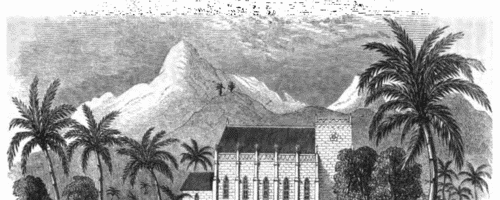
| Traders and professionals in London
(1856)
The Post Office London Directory for 1856 includes this 'Commercial and Professional Directory', recording over 100,000 individuals. SCAMMEL. Cost: £4.00.  | Sample scan, click to enlarge

|  Persons of standing recommending London police recruits
(1843-1857) Persons of standing recommending London police recruits
(1843-1857)
The Metropolitan Police Register of Joiners (MEPO 4/334) lists policemen joining the force 1 January 1843 to 1 April 1857 (warrant numbers 19893 to 35804). The register is alphabetical, in so far as the recruits are listed chronologically grouped under first letter of surname. It gives Date of Appointment, Name, Number of Warrant, Cause of Removal from Force (resigned, dismissed, promoted or died), and Date of Removal. Although the register was closed for new entrants at the end of 1842, the details of removals were always recorded, some being twenty or more years later. Those recruits not formerly in the police, the army, or some government department, were required to provide (normally) at least two letters of recommendation from persons of standing, and details of these are entered on the facing pages. Where a recruit was only recently arrived in the metropolis, the names and addresses of the recommenders can be invaluable for tracing where he came from. Those recruits not formerly in the police, the army, or some government department, were required to provide (normally) at least two letters of recommendation from persons of standing, and details of these are entered on the facing pages: the names in these are indexed here (the police recruits are indexed separately and not included here). Recruits transferred from other forces or rejoining the force did not normally need recommendations - in the latter case, former warrant numbers are given - but some recommendations are from police inspectors, even other constables. Recruits coming from the army sometimes have general military certificates of good conduct, but most often have a letter from their former commanding officer; recruits recommended by government departments (most often the Home Office) similarly have letters from the head of department. But the great majority of the names and addresses in these pages are of respectable citizens having some sort of personal acquaintance with the recruit. Where more than two recommendations were provided, the clerk would only record one or two, with the words 'and others'. Tradesmen are sometimes identified as such by their occupations; there are some gentry. Although the bulk of these names are from London and the home counties, a scattering are from further afield throughout Britain and Ireland. SCAMMEL. Cost: £8.00.  | Sample scan, click to enlarge

| Ordinations of Congregationalist Ministers
(1868-1869)
In 'The Christian Witness and Congregational Magazine', published monthly, was a section called 'The Congregational Register', detailing recent Congregationalist activity at home and abroad. It included Ordinations; Recognitions (services when a new minister is introduced to his congregation); Calls Accepted (newly-qualified theological students are appointed to their first posts); Removals (of ministers from one place to another); Resignations; Deaths of Ministers; Deaths of Ministers' Wives; Deaths of Ministers' Widows; and Testimonials (presentations by congregations to long-serving or departing ministers). Precise dates and places are usually given in the case of ordinations, recognition services and deaths. The ministers are referred to by surname and initials; the ministers' wives and widows are never given christian name or initials. The register from New Series volume 5, issued from January to December 1869, covers events from October 1868 to November 1869.SCAMMEL. Cost: £6.00.  | Sample scan, click to enlarge
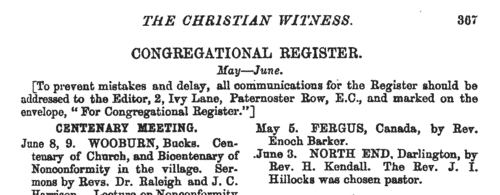
| Baptists
(1871)
The Baptist Messenger was produced monthly. The material indexed is mainly the Denominational Intelligence, i. e. the doings of the Baptist churches in Britain and Ireland, including summary lists of baptisms naming only the ministers. There are also some Baptist obituaries, and lists of donations to the Pastors' College at the Metropolitan Tabernacle in London. SCAMMEL. Cost: £6.00.  | Sample scan, click to enlarge

| Baptists
(1876)
The Baptist was a weekly newspaper, with some general news and political coverage, but mainly devoted to chronicling Denominational Intelligence, i. e. the doings of the Baptist churches in Britain and Ireland. July to December 1876.SCAMMEL. Cost: £6.00.  | Sample scan, click to enlarge
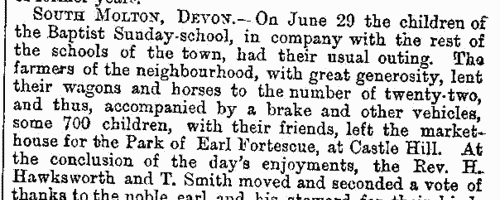
|
Research your ancestry, family history, genealogy and one-name study by direct access to original records and archives indexed by surname.
|













